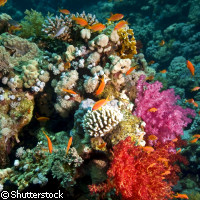New project to study impact of ocean acidification on marine ecosystems
A new EU-funded project is set to shed light on the impact of ocean acidification on marine organisms and ecosystems. EPOCA ('European project on ocean acidification') will be officially launched at a conference in Nice, France, on June 10. The oceans are one of the biggest carbon sinks and as such they play a key role in regulating levels of carbon dioxide (CO2) in the atmosphere. Since the beginning of the industrial revolution a little more than 200 years ago, the world's oceans have taken up about one third of man-made CO2. Today, over 25 million tonnes dissolve in seawater every day. Ocean acidification is a process that results from this absorption of large amounts of CO2. When CO2 dissolves in the water, carbonic acid is formed, causing the ocean to become more acidic. While this has been a well-known fact since the 1990s, fairly little is known about the effects of this acidification on the marine flora and fauna. Previous research indicates, however, that organisms with calcareous skeletons such as corals and molluscs will grow more slowly due to the process. The EPOCA consortium will further investigate these effects, document ocean acidification and predict its consequences over the next 100 years. In more detail, the scientists will study, for instance, how ocean chemistry has varied in the past, the sensitivity of calcification and autotrophic processes, reproduction and growth, microbial diversity and activity, future changes in ocean carbonate chemistry and biogeochemical impacts. Based on their findings, they will attempt to identify so-called tipping points that should not be exceeded. 'This research will strengthen Europe's position in this relatively new field of environmental research and will enable national programmes to coordinate their research and complement one another,' says Professor Ulf Riebesell of the marine research institute IFM-GEOMAR in Kiel, Germany. 'Our research will help to identify critical thresholds, which - once those thresholds have been crossed - can have incalculable consequences for the marine ecosystems,' adds Professor Jelle Bijma, a marine biogeologist at the Alfred Wegner Institute (AWI) in Bremerhaven, Germany. The four-year EPOCA project will receive €6.5 million of its total cost of €16.5 million from the European Commission under its Seventh Framework Programme (FP7). EPOCA will be coordinated by the French National Centre for Scientific Research (CNRS) and bring together a consortium of 27 partners from nine countries inside and outside the EU. More than 100 permanent scientists will be involved.



